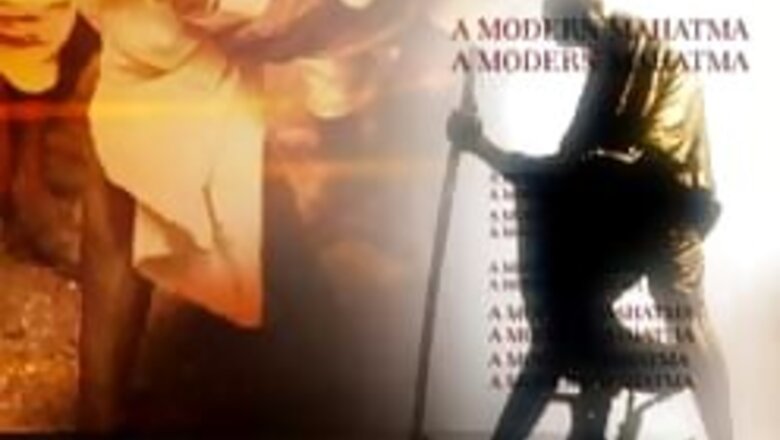
views
New Delhi: Almost 60 years after his demise, Mahatma Gandhi continues to be the strongest symbol of non-violence and peace world over in the 20th century. But then it remains the biggest intrigue as to why he was never selected for the Nobel Peace Prize.
For the record, Gandhi was nominated as many as five times for the coveted award of the Nobel Foundation. Thrice he made it to the shortlist, but every time he was left out in the last count. Nobody knows why.
In the later years, though, members of the Nobel Committee have publicly regretted the omission. On at least one occasion, the Nobel Foundation, in fact, came very close to admitting a lapse, when awarding the Peace Prize to Dalai Lama in 1989, the chairman of the committee said this was "in part a tribute to the memory of Mahatma Gandhi."
The Nobel Foundation has never commented on the speculations as to why Gandhi was not awarded the prize. But, writing on the official website of the Nobel Foundation (http://nobelprize.org), Oyvind Tonnesson, Nobel e-Museum Peace Editor during 1998-2000, provides very intricate details about the circumstances under which Gandhi's name came up for consideration at the Nobel Committee.
Tonnesson's account broadly points to three factors that might have gone against Gandhi every time his name went into the shortlist -- Chauri Chaura, Partition and the 1947 India-Pakistan conflict, and lastly the absence of a true inheritor to receive the award posthumously.
Other speculative accounts say it is possible that the horizon of the Norwegian Nobel Committee was too narrow at that point of time to appreciate the struggle for freedom among non-European peoples or maybe the committee members were afraid to make a prize award which might be detrimental to the relationship between their own country and Great Britain.
Tonnesson also points out that up to 1960, the Nobel Peace Prize was awarded almost exclusively to Europeans and Americans.
Here is what Tonnesson's account says about the inside processes of the Nobel Committee.
- In 1937, a member of the Norwegian Storting (Parliament), Ole Colbjornsen (Labour Party), nominated Gandhi for that year's Nobel Peace Prize, and he was duly selected as one of 13 candidates on the Nobel Peace Prize shortlist.
PAGE_BREAK
But the report on Gandhi that the Nobel Committee received was critical of him. "He is, undoubtedly, a good, noble and ascetic person – a prominent man who is deservedly honoured and loved by the masses of India," wrote the panel's adviser, Professor Jacob Worm-Müller.
Then he added: "...sharp turns in his policies, which can hardly be satisfactorily explained by his followers. (...) He is a freedom fighter and a dictator, an idealist and a nationalist. He is frequently a Christ, but then, suddenly, an ordinary politician."
Prof Worm-Müller cited Chauri Chaura and referred to many of Gandhi's critics to maintain that he was not consistently pacifist, that he should have known that some of his non-violent campaigns towards the British would degenerate into violence and terror.
Prof Worm-Müller also said while Gandhi's struggle in South Africa is well-known, "it was on behalf of the Indians only, and not of the blacks whose living conditions were even worse." Lord Cecil of Chelwood won the prize in 1937.
Colbjornsen renominated Gandhi again in 1938 and 1939, but he didn't even made the shortlist on these two occasions.
In 1947, 10 years later, Gandhi made it to the Nobel Peace Prize shortlist again, among six names.
According to Tonnesson, this time the nominations of Gandhi came by telegram from India, via the Norwegian Foreign Office, from BG Kher, Prime Minister of Bombay, Govindh Bhallabh Panth, Premier of United Provinces, and Mavalankar, the President of the Indian Legislative Assembly.
GB Panth recommended him for the Nobel Prize "as the architect of the Indian nation, the greatest living exponent of the moral order and the most effective champion of world peace."
But Partition seems to have played a spoiler this time. The Nobel Committee report said: "The following 10 years, from 1937 up to 1947, led to the event which for Gandhi and his movement was at the same time the greatest victory and the worst defeat – India's independence and India's Partition."
PAGE_BREAK
Writing the report on Gandhi, Nobel Committee's adviser Jens Arup Seip, a historian, said: "It is generally considered, as expressed for example in The Times of 15 August 1947, that if 'the gigantic surgical operation' constituted by the Partition of India, has not led to bloodshed of much larger dimensions, Gandhi's teachings, the efforts of his followers and his own presence, should get a substantial part of the credit."
Then there was this report on The Times, London, on September 27, 1947, under the headline "Mr. Gandhi on 'war' with Pakistan". The report was based on a telegram from Reuters. It read:
"Mr Gandhi told his prayer meeting tonight that, though he had always opposed all warfare, if there was no other way of securing justice from Pakistan and if Pakistan persistently refused to see its proved error and continued to minimise it, the Indian Union Government would have to go to war against it. No one wanted war, but he could never advise anyone to put up with injustice. If all Hindus were annihilated for a just cause he would not mind. If there was war, the Hindus in Pakistan could not be fifth columnists. If their loyalty lay not with Pakistan, they should leave it. Similarly, Muslims whose loyalty was with Pakistan should not stay in the Indian Union."
Gandhi had immediately stated that the report was correct, but incomplete. At the meeting, he had added that he himself had not changed his mind and that "he had no place in a new order where they wanted an Army, a Navy, an Air Force and what not."
But the members of the Nobel panel became very doubtful. One member wrote in his diary: "While it is true that he (Gandhi) is the greatest personality among the nominees – plenty of good things could be said about him – we should remember that he is not only an apostle for peace; he is first and foremost a patriot. (...) Moreover, we have to bear in mind that Gandhi is not naive. He is an excellent jurist and a lawyer."
According to Tonnesson, the Committee Chairman seems to have suspected Gandhi's statement one month earlier to be a deliberate step to deter Pakistani aggression. Three of five members of the Nobel Committee thus went against awarding the 1947 prize to Gandhi, and the panel unanimously decided to award it to the Quakers.
> Gandhi was again nominated for the Nobel Peace Prize just a few days before he was murdered on January 30, 1948.
PAGE_BREAK
In fact, the Mahatma was assassinated just two days before the closing date for that year's Nobel Peace Prize nominations. There were six letters of nomination naming Gandhi; among the nominators were the Quakers and Emily Greene Balch, both former Nobel laureates.
Gandhi did make it to the Nobel Committee's shortlist of three names.
It was Jens Arup Seip again, writing the report on Gandhi. This time he focussed on his activities during the last five months of his life. Seip concluded that Gandhi, through his course of life, had put his profound mark on an ethical and political attitude which would prevail as a norm for a large number of people both inside and outside India. "In this respect, Gandhi can only be compared to the founders of religions."
But the problem was, nobody had ever been awarded the Nobel Peace Prize posthumously. According to the statutes of the Nobel Foundation in force at that time, the Nobel Prizes could, under certain circumstances, be awarded posthumously. "Thus it was possible to give Gandhi the prize. However, Gandhi did not belong to an organisation, he left no property behind and no will; who should receive the Prize money?" Tonnesson
"The Director of the Norwegian Nobel Institute, August Schou, asked another of the Committee's advisers, lawyer Ole Torleif Roed, to consider the practical consequences if the committee were to award the prize posthumously. Roed suggested a number of possible solutions for general application."
"Subsequently, he asked the Swedish prize-awarding institutions for their opinion. The answers were negative; posthumous awards, they thought, should not take place unless the laureate died after the Committee's decision had been made," Tonnesson states.
On November 18, 1948, the Norwegian Nobel Committee decided to make no award that year on the grounds that 'there was no suitable living candidate'.
On hindsight, Tonnesson says: "It seems reasonable to assume that Gandhi would have been invited to Oslo to receive the Nobel Peace Prize, had he been alive one more year" for the Nobel panel could not have anyone else in their mind but Gandhi when they said 'there was no suitable living candidate'.




















Comments
0 comment